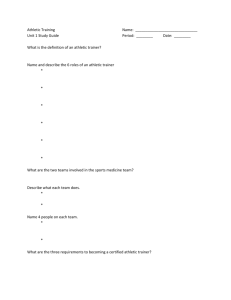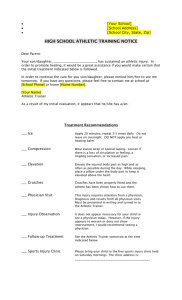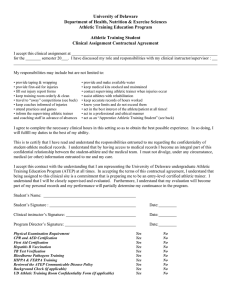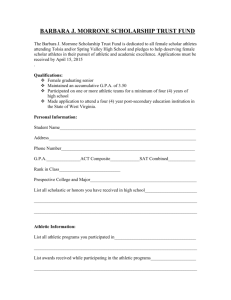Athletic Training Student Relationships
advertisement
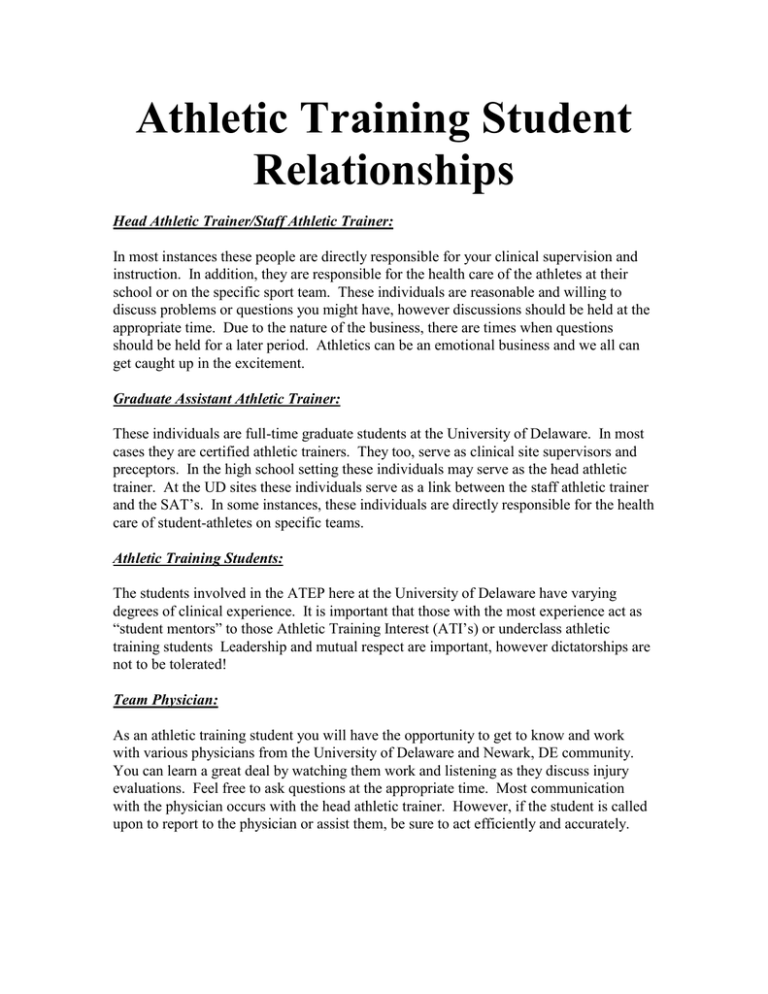
Athletic Training Student Relationships Head Athletic Trainer/Staff Athletic Trainer: In most instances these people are directly responsible for your clinical supervision and instruction. In addition, they are responsible for the health care of the athletes at their school or on the specific sport team. These individuals are reasonable and willing to discuss problems or questions you might have, however discussions should be held at the appropriate time. Due to the nature of the business, there are times when questions should be held for a later period. Athletics can be an emotional business and we all can get caught up in the excitement. Graduate Assistant Athletic Trainer: These individuals are full-time graduate students at the University of Delaware. In most cases they are certified athletic trainers. They too, serve as clinical site supervisors and preceptors. In the high school setting these individuals may serve as the head athletic trainer. At the UD sites these individuals serve as a link between the staff athletic trainer and the SAT’s. In some instances, these individuals are directly responsible for the health care of student-athletes on specific teams. Athletic Training Students: The students involved in the ATEP here at the University of Delaware have varying degrees of clinical experience. It is important that those with the most experience act as “student mentors” to those Athletic Training Interest (ATI’s) or underclass athletic training students Leadership and mutual respect are important, however dictatorships are not to be tolerated! Team Physician: As an athletic training student you will have the opportunity to get to know and work with various physicians from the University of Delaware and Newark, DE community. You can learn a great deal by watching them work and listening as they discuss injury evaluations. Feel free to ask questions at the appropriate time. Most communication with the physician occurs with the head athletic trainer. However, if the student is called upon to report to the physician or assist them, be sure to act efficiently and accurately. Coaches: Learn to get along with the coaching staff. Most injury information will be reported to the coaching staff from the head athletic trainer. Athletic training students should not discuss injuries with the coaches unless given that responsibility by the clinical supervisor/head athletic trainer. Coaches often become frustrated in “the heat of the moment” during competition or practice. Always act respectful to the coaching staff. Keep your composure and do your job! General Public, Media, and Student Body: As an athletic training student you may be confronted with questions regarding the health of a student-athlete under your care. This information is confidential and should not be discussed with anyone outside the sports medicine team. Keep in mind the confidentiality pledge. Any information that is released is done so by the appropriate individuals on the coaching staff or administration. Athletes: The friendships developed through athletics can be priceless, but as an athletic training student you must keep things in perspective. In some cases the athletes are your peers, whom you may have classes, share housing, or socialize. It is important that the athletic training student maintain a professional relationship with all athletes. As an athletic training student you are available to help and assist the athletes with their health care needs, not to “pamper” them. Do not run a popularity contest or attempt to give special privileges to anyone. Avoid horseplay with the athletes. Do not attempt to cover for an athlete. Do not discuss an injury with an athlete in specific or speculative terms. Do not socialize with the high school athletes. If you have a problem with a specific athlete, bring the issue to the attention of the head athletic trainer, staff athletic trainer, or graduate assistant athletic trainer. Student Managers: It is important to maintain a good working relationship with the managers. Some duties between athletic trainers and managers overlap, so it is important that they work together for the “good of the team”. Problems should be forwarded to the clinical supervisor.
